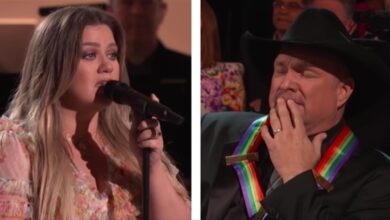Incredible Performance: Elvis Presley’s Grandson | So Excited To See Him Live!
Benjamin Keough’s performance of “Folsom Prison Blues” on *The Voice* marked a significant moment not just for him but for the audience that tuned in. As the grandson of Elvis Presley, he carries a legacy that is both a blessing and a challenge, deeply intertwining his personal narrative with that of one of the most iconic figures in music history. This connection inevitably draws attention, but it also sets high expectations for how he approaches his artistry. In his blind audition, Keough didn’t just ride on the coattails of his grandfather’s fame; instead, he worked to carve out his own identity within a tradition that is filled with rich musical heritage.
At only 28 years old, Benjamin showcased a vocal prowess that belied his age. His ability to interpret the classic Johnny Cash song demonstrated not only technical skills but also a profound understanding of the emotional gravity of the material. Keough’s blend of country, rock ‘n’ roll, and blues through his rendition was particularly striking. It was not merely a cover; it was a revitalization of a song teeming with themes of hardship and redemption. His performance was steeped in a raw intensity that resonated deeply with viewers, establishing a genuine connection that is essential for any performing artist.
The reactions from the judges were emblematic of the impact Benjamin’s audition had on the competition. Kelly Clarkson, no stranger to discovering and nurturing musical talent, was clearly impressed. Her describing him as a “genius” underscored how she saw reflections of Elvis’s vocal style in his singing while also recognizing his potential to innovate and evolve artistically. Such high praise from a seasoned artist like Clarkson not only serves as validation but also highlights the unique position Keough occupies in the current music landscape: balancing the weight of his legacy with his ambitions as an individual artist.
Blake Shelton’s encouragement further solidified the positive reinforcement Keough received from the judges. Shelton’s emphasis on authenticity indicated his belief that Keough’s approach to music is sincere and heartfelt, traits that are paramount in the country genre. Authenticity is often what draws listeners in, and Keough’s delivery appeared to resonate well with both the jury and the audience alike. As he continues to progress in the competition, Shelton’s acknowledgment could greatly bolster Keough’s confidence and encourage him to take creative risks, which can be crucial for artistic growth.
Navigating the path laid out by a family legacy as monumental as that of Elvis Presley comes with its own set of challenges. However, Benjamin seems to approach this both as a privilege and a responsibility. Rather than merely imitating his grandfather or resting on his laurels, he has chosen to explore the musical landscape with a personal touch. “Folsom Prison Blues” is a piece that resonates with many, yet Keough’s interpretation was infused with a fresh perspective that showcases his individuality while still respecting the roots from which he comes.
Keough’s charisma also plays a vital role in his burgeoning career. While vocal talent is crucial, a compelling stage presence can elevate a performance to new heights. During his audition, he exuded confidence, and his ability to engage the audience created an electric atmosphere that was undeniably contagious. Standing ovations are a powerful indicator of audience approval, and his performance successfully captured the ambiance necessary to push him toward further success in *The Voice*.
As he moves forward in the competition, Benjamin Keough is sure to attract attention due to both his lineage and his distinct artistic choices. The initial success of his blind audition sets a promising tone for his future performances, but it also brings with it an expectation to continually surprise and delight his audience. Given his blend of influences—from the classic rock and roll that echoes through his heritage to the contemporary sounds he aims to create—there is a palpable excitement surrounding his journey. Each new performance presents an opportunity for him to redefine or reinforce his identity as an artist, making it even more intriguing to witness how he evolves.
The complexities surrounding musical inheritance cannot be understated, as Keough is poised not just to uphold a legacy but to also forge his own path within it. His rendition of “Folsom Prison Blues” became a canvas for him to express who he is while simultaneously honoring the music that has come before him. Keough’s thoughtful approach marries tradition with modernity—an endeavor that many strive for in today’s music industry—and this balance could very well be the key to his success.
In the end, Benjamin Keough’s appearance on *The Voice* serves as a testament to the enduring power of music and the stories that it tells. The emotional resonance of his performance, coupled with the weight of familial legacy, creates a rich narrative that is captivating to audiences. As he continues to take the stage, fans and critics alike will undoubtedly be on the lookout for moments that not only reflect his growth as an artist but also the way he engages with his profound musical inheritance. The journey ahead promises excitement and potential for an artist striving to make his own mark while cherishing the impactful history of those who came before him.





